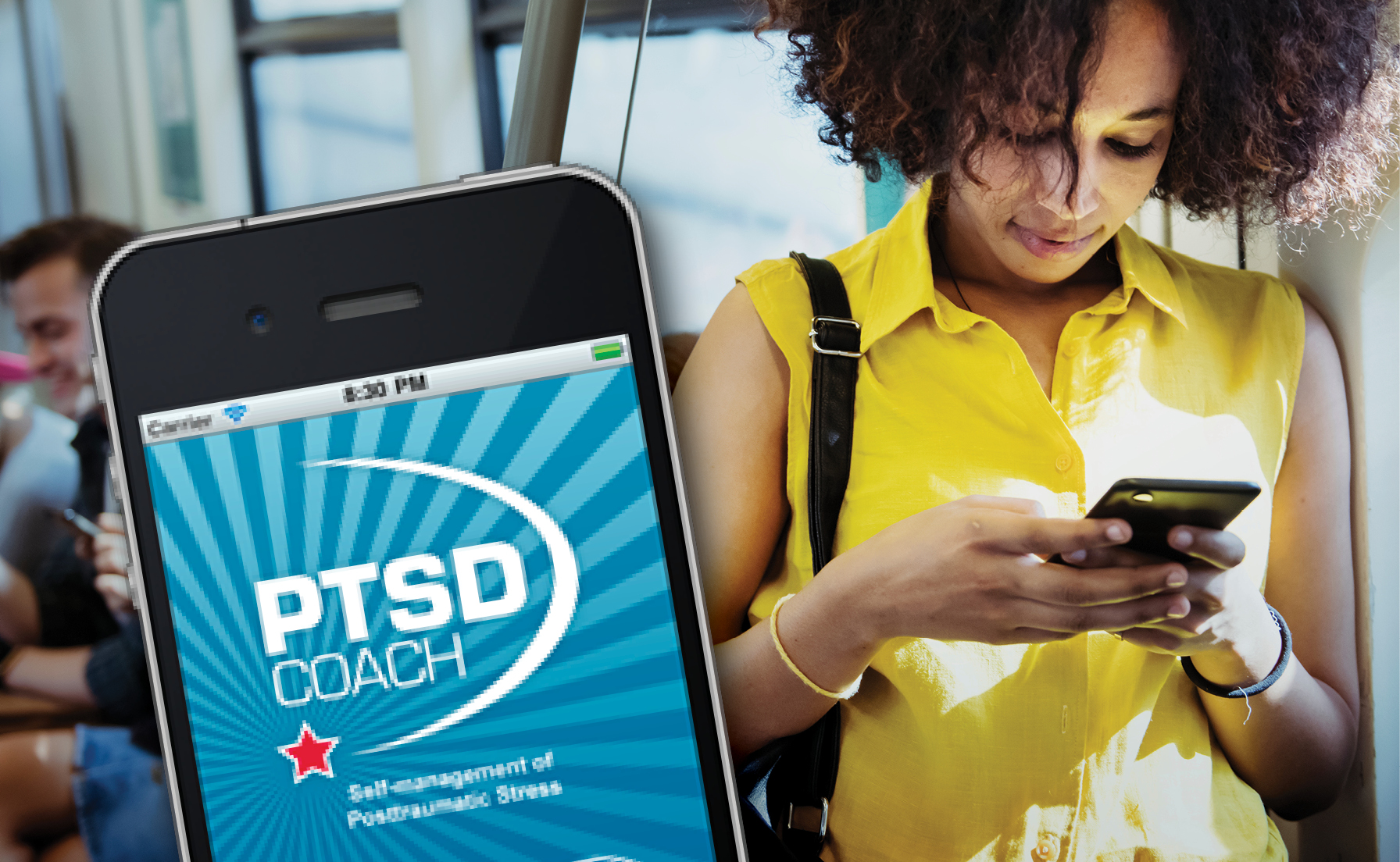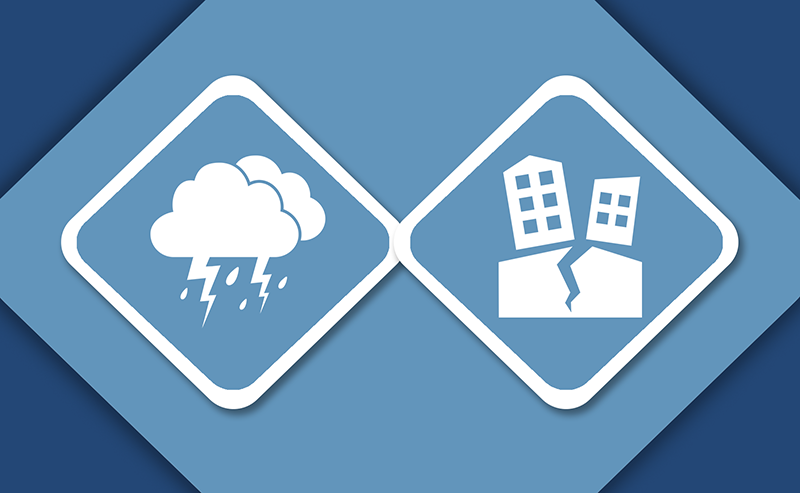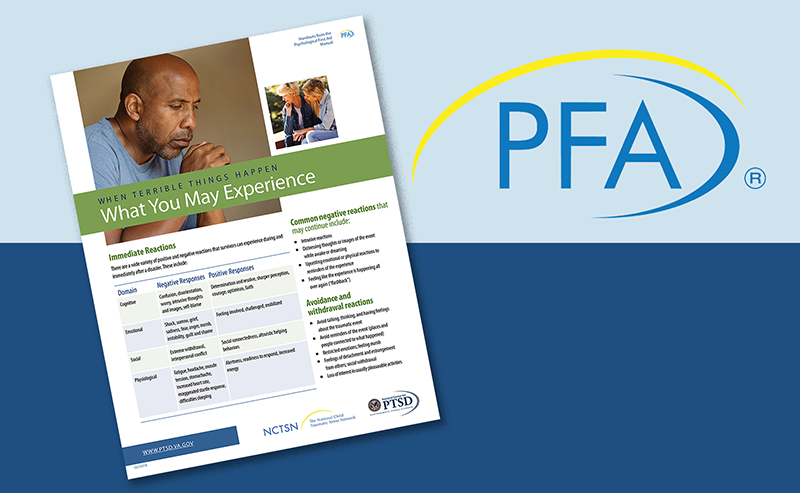PTSD: National Center for PTSD
Help for Those Affected by Disaster Events
Help for Those Affected by Disaster Events
Disaster events can cause stress and loss. If you have been through a disaster, you may need resources that offer information, practical help, or support. Learn about help and support resources that can improve resilience and build coping skills.
Reading time: minutes
Disaster events include natural or human-caused disasters, mass violence, and public health emergencies like disease outbreaks, chemical spills, or radiation emergencies. Most people who have been through disaster events, will do better if they feel safe, connected to others, calm, capable, and hopeful. Some people may need extra help. For those that do, most can get back on their feet with the education, practical help, and support included in recovery programs like Psychological First Aid (PFA), described below.
Practical Help
A key to recovery from disaster events is feeling that you have the resources to help you rebuild your life. At the most basic, that means information, food, safety, medical care, and shelter. Other important resources are family, community, school or work, and friends. In fact, having resources is so important that many disaster or mass violence support programs focus mostly on providing practical help and building people's resources.
Psychological First Aid
Community recovery workers often use components included in programs like Psychological First Aid (PFA) to provide early support for people's needs after disaster events, such as safety, comfort, calming, and practical help. The National Center for PTSD and National Center for Child Traumatic Stress created PFA handouts, available in the manual, that can help you and your family become more resilience after disaster events.
Building Community Resilience
Resilience is the ability to "bounce back" after challenges. Bringing people together to rebuild their communities, access resources, make shared decisions, and learn and grow from what has happened can support community resilience. So can cultural, memorial, spiritual, and religious healing practices and events. Taking part in memorial events and gatherings is important for many people who have been through disaster events. They can be a way to increase social support. Memorial activities also allow people to mourn the community's losses while making meaning of what has happened. Getting back to the normal rhythms and routines of life and crafting a positive vision of the future, with renewed hope, can also help. Local recovery programs support community resilience by linking people with resources that are already in place or that are set up after disaster events.
Community resilience means honoring the needs of the whole community. That includes supporting those who may need extra assistance or who have been historically excluded. People with health, sensory, or movement challenges, LGTBQ+ people, and people who belong to religious, ethnic, or racial groups that have experienced historical exclusion may feel—or be made to feel—like "outsiders" in some settings. Resilience can be fostered by increasing access to friendship networks, "families of choice," and preferred community organizations. Resilience is also fostered by building bridges to connect communities that have been marginalized with the wider community.
Crisis Counseling and Skill-Building
Community programs and skill-building interventions can assist with more long-term needs after disaster events. For example, the Federal Emergency Management Agency (FEMA) Crisis Counseling and Training Program (CCP) provides resource information, support, and practical help to foster resilience and growth in children and adults, families, and communities affected by federally declared disasters. Skills for Psychological Recovery (SPR) is a skill-building intervention that is often provided by crisis counselors and local providers to develop and make stronger the skills that are related to better recovery following disaster events, including:
- Problem-solving
- Planning more positive and meaningful activities
- Managing stress reactions
- Engaging in more helpful thinking
- Building healthy social connections
You can use SPR handouts, included in the manual (Appendices), to learn about and practice these skills.
Trauma-Focused Treatment
For those in need of more in-depth (or intensive) services than PFA, community recovery programs, crisis counseling, or SPR, trauma-focused psychotherapies (or talk therapies) may be helpful. "Trauma-focused" means that the treatment focuses on memories and the meaning of traumatic events. Trauma-focused psychotherapies use different methods to help someone process traumatic experiences. For example, some involve visualizing, talking, or thinking about traumatic memories. Others focus on changing unhelpful thoughts and beliefs associated with adverse experiences. Such psychotherapies usually last about 8-16 sessions.
Learn more about Effective PTSD Treatments or compare treatments using the PTSD Treatment Decision Aid.
Summing It Up
No matter how you react to disaster events, with support and resources you can improve your resilience and build coping skills. Seek information and resources online or through community recovery programs that help individuals, families, and the community rebuild and recover.
Other Resources
- Survivors of Disaster Resource Portal:A website from the federal Substance Abuse and Mental Health Services Administration (SAMHSA) that provides resources to help you prepare for and cope with disasters or mass violence.
- Recovering Emotionally After a Disaster:
 A website from the American Red Cross that provides resources on emotional recovery, including materials in multiple languages.
A website from the American Red Cross that provides resources on emotional recovery, including materials in multiple languages. - Crisis Counseling Assistance and Training Program: A FEMA program to assist individuals and communities recovering from disasters through community-based outreach and educational services.
- National Child Traumatic Stress Network (NCTSN):
 This organization offers information and resources for those affected by disasters
This organization offers information and resources for those affected by disasters and community violence
and community violence with a focus on children and families.
with a focus on children and families.
You May Also Be Interested In


























